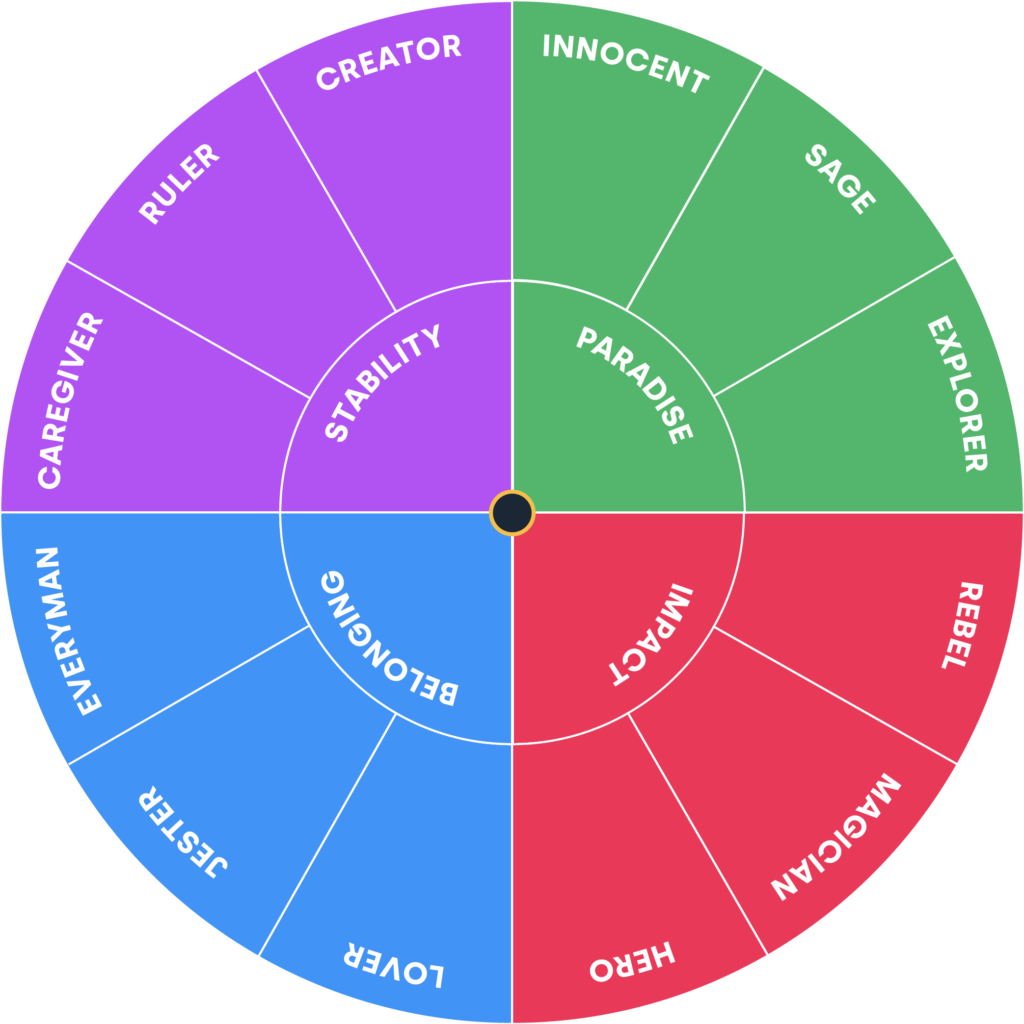When we connect with a brand, we feel an affinity to it that’s difficult to define. The most loved and trusted brands connect with their customers on a deeper level than their competitors, creating a persona that captures their imagination, tells a clear story, and appeals to both rational and emotional desires. Simply put, these brands seem familiar and make us feel valued.
Brands generate this attachment by tapping into universal patterns of behavior that humans understand instinctively, mirroring the personalities that we see in ourselves, our peers, in stories, art, and even religion. While we don’t immediately think of a specific archetype when we see a brand, our understanding of personalities is instinctive, so based on our unconscious perceptions, we’re able to decide which brands we want to connect with and which we want to avoid.
According to Harvard Professor Gerald Zaltman>, the vast majority (95%) of our purchasing decisions are made in the subconscious mind, so brands with a unique archetypal personality that connects them with customers have a huge advantage over the competition.
The 12 brand personalities
Psychologist Carl Jung theorized that humans use symbolism to understand complex concepts more easily. As a result of his research, Jung identified that brands fit into four key goals: Paradise, Impact, Belonging, and Stability. No matter which of these goals your company mission fits into, your brand will act as a pathway to achieving it. Brands do this by acting as a reflection of one of these 12 archetypes, connecting with people who exhibit the same.

Paradise
The Innocent
The Innocent brand archetype exhibits happiness, goodness, optimism, safety, and youth, valuing simplicity and authenticity. Innocent brands don’t want to offend or harm anyone, and often have an extremely positive outlook on life.
Example brands include: Whole Foods, Nintendo Wii, Dove
The Sage
Sage brands are committed to helping the world gain deeper insight and wisdom, serving as thoughtful mentor or advisor. This archetype is a trusted source of information and uses solid facts to back up statements.
Example brands include: Google, The New York Times, TED
The Explorer
The Explorer taps into their audience’s desire to discover new places, people, and worlds. These brands find inspiration in travel and the thrill of adventure, always looking for pathways to self-fulfillment.
Example brands include: Jeep, The North Face, NASA
Impact
The Rebel
The Rebel, or the Outlaw, questions authority and dislikes rules, always looking to break the status quo. Craving rebellion and revolution, Rebel brands might even go against societal norms out of pure boredom.
Example brands include: Virgin, Harley-Davidson, Diesel
The Magician
The goal of the Magician brand is to create something special and dream-fulfilling for each customer. The Magician is seen as visionary and spiritual, focusing heavily on creativity and imagination.
Example brands include: Mastercard, Disney, Polaroid
The Hero
On a mission to make the world a better place, the Hero is courageous, bold, and inspirational. The Hero archetype is a source of inspiration, never intimidating but always inspiring others to work harder.
Example brands include: Nike, FedEx, Duracell
Belonging
The Lover
The Lover brand archetype is a true romantic, valuing relationships over anything else. These brands create intimate moments and find strength in love, intimacy, and romance, focusing heavily on aesthetic appeal.
Example brands include: Victoria’s Secret, Chanel, Haagen Dazs
The Jester
Bringing joy to the world through humor, fun, and mischief, the Jester archetype doesn’t take itself too seriously and encourages the audience to laugh along with them. These brands help their customers let go of stress and come out of their shells.
Example brands include: Old Spice, Ben & Jerry’s, M&Ms
The Everyman
Everyman brands simply want to let their customers know that they belong. Unlike other archetypes that have an elitist personality, this archetype seeks connections and belonging and is recognized as supportive, faithful, and down-to-earth.
Example brands include: IKEA, Visa, eBay
Stability
The Caregiver
The Caregiver brand archetype is empathetic, nurturing, and generous, focusing on protecting and caring for others. The goal of the Caregiver is to make customers feel secure or emotionally and physically supported.
Example brands include: Johnson & Johnson, Pampers, UNICEF
The Ruler
Creating order from chaos, the Ruler is typically controlling and stern, yet responsible and organized. This archetype strives to be the best of the best and is known for perfection and attention to detail.
Example brands include: Mercedes-Benz, Rolex, IBM
The Creator
The Creator archetype is all about innovation and creativity, usually the first ones to introduce new technology and ways of thinking. Creator brands prioritize imagination and free self-expression, building products or services with enduring value.
Example brands include: Lego, Apple, Adobe
How can you use your brand personality in practice?
By identifying and using your brand personality, your business can be built with empathy at the forefront, ensuring that you make decisions based on what will resonate with your customers, rather than just your individual likes and dislikes. Using a brand personality also ensures that messaging and visuals are consistent across all customer touchpoints, developing a unique tone of voice and highlighting the points of difference against your competitors.
The best way to work when getting to know your brand personality is collaboratively. At FMXA, we work with your team to gather an understanding of your customer, how they should feel when interacting with your brand, and how your company should be perceived. This allows us to identify together which brand personality you best fit into, which we combine with our work defining your competitors, ideal customers, and values, to inform your unique messaging story, visual identity, and key differentiation points.
By treating your brand personality as the foundation when developing your website, sales and marketing assets, and social channels, you can establish a stronger human connection with your customers unconsciously, turning them into advocates who feel passionate about your brand.
Helping you find your brand personality
We’d love to help you take your brand to the next level. Get in touch for a chat about our brand services and how they fit into your business plans.
